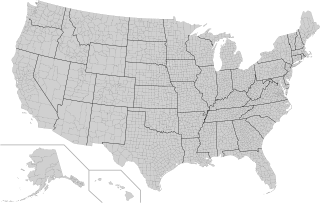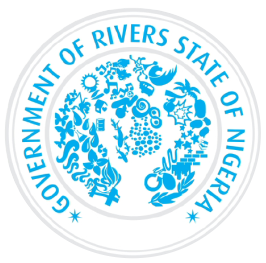
The federal government of Nigeria is composed of three distinct branches: legislative, executive, and judicial, whose powers are vested by the Constitution of Nigeria in the National Assembly, the President, and the federal courts, including the Supreme Court, respectively.

In the United States, an administrative or political subdivision of a state is a county, which is a region having specific boundaries and usually some level of governmental authority. The term "county" is used in 48 U.S. states, while Louisiana and Alaska have functionally equivalent subdivisions called parishes and boroughs respectively.

Tyne and Wear ( ) is a metropolitan county in the North East region of England around the mouths of the rivers Tyne and Wear. It came into existence in 1974 after the passage of the Local Government Act 1972. It consists of the five metropolitan boroughs of South Tyneside, North Tyneside, City of Newcastle upon Tyne, Gateshead and City of Sunderland. It is bounded on the east by the North Sea, and has borders with Northumberland to the north and County Durham to the south.

Merseyside is a metropolitan county in North West England, with a population of 1.38 million. It encompasses the metropolitan area centred on both banks of the lower reaches of the Mersey Estuary and comprises five metropolitan boroughs: Knowsley, St Helens, Sefton, Wirral, and the city of Liverpool. Merseyside, which was created on 1 April 1974 as a result of the Local Government Act 1972, takes its name from the River Mersey.

Port Harcourt is the capital and largest city of Rivers State, Nigeria. It lies along the Bonny River and is located in the Niger Delta. As of 2016, the Port Harcourt urban area has an estimated population of 1,865,000 inhabitants, up from 1,382,592 as of 2006.
A royal commission is a major ad-hoc formal public inquiry into a defined issue in some monarchies. They have been held in the United Kingdom, Australia, Canada, New Zealand, and Saudi Arabia. A royal commission is similar in function to a commission of enquiry found in other countries such as Ireland, South Africa, and regions such as Hong Kong. It has considerable powers, generally greater even than those of a judge but restricted to the terms of reference of the commission. The commission is created by the head of state on the advice of the government and formally appointed by letters patent. In practice—unlike lesser forms of inquiry—once a commission has started the government cannot stop it. Consequently, governments are usually very careful about framing the terms of reference and generally include in them a date by which the commission must finish.

Hobart City Council is a local government body in Tasmania, covering the central metropolitan area of the state capital, Hobart. The Hobart local government area has a population of 50,439 and includes the suburbs of New Town, Sandy Bay and most of Fern Tree and Mount Nelson.
Taxes in India are levied by the Central Government and the state governments. Some minor taxes are also levied by the local authorities such as the Municipality.

The California Department of Fish and Wildlife (CDFW), formerly known as the California Department of Fish and Game (CDFG), is a state agency under the California Natural Resources Agency. The Department of Fish and Wildlife manages and protects the state's fish, wildlife, plant and native habitats. It is responsible for related recreational, commercial, scientific, and educational uses. It also works to prevent illegal poaching.
Water supply and sanitation in Mexico is characterized by achievements and challenges. Among the achievements is a significant increase in access to piped water supply in urban areas as well as in rural areas between 1990 and 2010. Additionally, a strong nationwide increase in access to improved sanitation was observed in the same period. Other achievements include the existence of a functioning national system to finance water and sanitation infrastructure with a National Water Commission as its apex institution; and the existence of a few well-performing utilities such as Aguas y Drenaje de Monterrey.

The judiciary of Somalia is defined by the Provisional Constitution of the Federal Republic of Somalia. It stipulates that the national court structure is to be organized into three tiers: the Constitutional Court, Federal Government level courts, and Federal Member State level courts. A future nine-member Judicial Service Commission is empowered to appoint any federal tier member of the judiciary. It also selects and presents potential Constitutional Court judges to the House of the People of the Federal Parliament for approval. If endorsed, the President then appoints the candidate as a judge of the Constitutional Court. The five-member Constitutional Court is likewise empowered to adjudicate issues pertaining to the constitution, in addition to various federal and sub-national matters.

The government of Japan is a constitutional monarchy in which the power of the Emperor is limited and is relegated primarily to ceremonial duties. As in many other states, the Government is divided into three branches: the Legislative branch, the Executive branch, and the Judicial branch.
The Rivers State Independent Electoral Commission (RSIEC), is a statutory body constituted by the Government of Rivers State, under section 5(a) of the Independent Electoral Commission Law (2000) to oversee the implementation of election procedures. Headquartered in Port Harcourt, the Commission's primary function is "to organize, undertake and supervise all elections to local government councils within the state." It consists of 7 members who are appointed by the Governor of Rivers State with confirmation by the Rivers State House of Assembly.
The Politics of Rivers State function within the framework of a presidential republic, with the Governor of Rivers State as both head of state and head of government. Rivers State is known for a politically engaged citizenry. The official seat of government is in Port Harcourt. Under the Constitution, Executive power is vested in the Governor and he or she exercises them directly. This does not change the fact that such authority may also be exercised through the Deputy Governor or Commissioners. Legislative power is vested in a 32-member unicameral House of Assembly. Judicial power is exercised solely by the judiciary of Rivers State.
The Rivers State Judicial Service Commission established under section 197 (1) (c) of the 1999 Constitution is the executive body that handles matters relating to appointment, discipline and promotion of Rivers State's judicial officers and their support staffs. It is chaired by the Chief Judge of the High Court of Rivers State.
The Rivers State Senior Secondary Schools Board is an agency of the government of Rivers State responsible for the development and management of the state's secondary education system. It is headquartered in Port Harcourt. Its formation was authorized by the Senior Secondary Schools Board Law No.5 of 2012.
Elections in Rivers State are supervised and conducted by two major electoral bodies, Rivers State Independent Electoral Commission (RSIEC) and the Independent National Electoral Commission (INEC). There are 23 local government areas, 319 electoral wards and 4442 polling units in the state. Elections for Governor and the House of Assembly are held every four years, along with federal elections for President and the National Assembly.
The following is a timeline of the governorship of Ezenwo Nyesom Wike, also known as the Wike administration, from his inauguration as Governor of Rivers State on 29 May 2015 to present.

The Georges River Council is a local government area located in the St George region of Sydney located south of the CBD, in New South Wales, Australia. The Council was formed on 12 May 2016 from the merger of the Kogarah City Council and Hurstville City Council.











